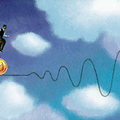A display of force in the Persian Gulf is unlikely to change Iranian minds over the country's nuclear programme
| |
 | |
IT IS easy to see why nine American warships carrying 17,000 personnel were sent steaming into the Persian Gulf, in broad daylight, on Wednesday May 23rd. That show of force coincided with a planned announcement from the International Atomic Energy Agency (IAEA) suggesting that Iran has been taking big strides in its nuclear programme, despite demands from the UN, Europe and America that the Islamic republic co-operate with international inspections and stop its research. Adding to the pressure France’s new president, Nicolas Sarkozy, made it clear, again on Wednesday, that he considers a nuclear-armed Iran “unacceptable” and that he would support tougher sanctions to discourage the government in Tehran.
But none of that seems likely to make much difference in Iran. The country’s leaders, who relish confrontation, have promised to resist “any kind of threat”. President Mahmoud Ahmadinejad recently gave warning of “severe” retaliation—presumably including attempts to blockade the Strait of Hormuz, where the American warships patrol and through which huge quantities of crude oil pass each day—if foreign forces were to attack Iran.
Outsiders worry that Iran is moving faster than expected in its nuclear programme. The IAEA says some 1,300 centrifuges are now spinning to enrich uranium at a facility in Natanz, a difficult task that many were not sure Iran could pull off. Some 3,000 centrifuges are probably needed to produce enough weapons-grade uranium to make a bomb in less than a year, and Iran may bring another 600 online by this summer. Iran insists the programme is strictly civilian, but many outsiders are convinced that the real intention is to get the means to make a nuclear weapon sooner rather than later.
A diplomatic confrontation will continue as outsiders struggle to bring effective pressure to bear. Iran’s negotiators will meet representatives from America and Europe later this month when they will claim to be willing to deal pragmatically over the nuclear programme. But attempts to talk have failed before. Even understanding the relative strengths of extremists and moderates among Iran’s leaders is difficult. The former seem to have an upper hand at the moment, apparently supporting insurgents in neighbouring Iraq and, possibly, in Afghanistan.
In Iran itself the space for liberals and dissidents is shrinking: women are harassed for immodest dress; an Iranian-American female scholar was recently arrested, jailed and charged—bizarrely—with plotting the overthrow of the regime. Less widely reported was the detention of Hossein Mousavian, a former top nuclear negotiator. He is accused of espionage after he allegedly had contact with employees of a foreign embassy. Iran is also holding an Iranian-American journalist for Radio Farda, an American-funded Persian-language station.
It is unclear whether the moderates in Iran, backed by a large middle class, can be encouraged to assert themselves. Tougher economic sanctions over the nuclear programme would risk generating more support for the hardliners, as would any military strikes. But engagement of Tehran’s leaders in effect means letting the country get away with flouting international rules on nuclear development. More troubling, the IAEA’s boss, Mohamed ElBaradei, has split from western powers, with a suggestion that Iran should be allowed to retain some uranium-enrichment capacity—a proposal that is expected to draw complaints from American and European envoys.
The coming week may act as a barometer for the prospects of any progress soon. On May 28th America’s ambassador in Iraq will meet an Iranian counterpart, but to talk only about Iraq’s security both sides insist. A couple of days later the next round of negotiations is expected between the EU’s foreign-policy chief, Javier Solana, and Iran’s current nuclear negotiator, Ali Larijani. Despite the show of force and the reports of the IAEA, there is little sign that Iran is ready to back down.




